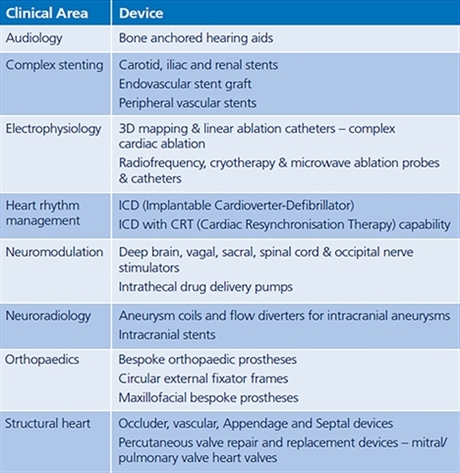11.04.17
A single approach for purchasing HCTEDs
Source: NHE Mar/Apr 17
Andy Leary, finance director of specialised commissioning (National) at NHS England, discusses the new system for buying and supplying high-cost tariff-excluded devices (HCTED) in specialised services.
Each year, the NHS makes a considerable investment in HCTED. To support the sustainability of specialised services and improve efficiency, last April NHS England introduced a new nationwide system for purchasing these products.
This single national approach for purchasing and supplying HCTEDs is operated by NHS Supply Chain through the NHS Business Services Authority (NHSBSA).
What has changed?
The new system has changed the funding model for the purchase of HCTEDs. Previously trusts paid for devices, such as implantable cardioverter defibrillators, then reclaimed the cost from NHS England. This allowed for wide variations in the prices paid for the same products, and in the rates of adoption and usage of devices across the country.
The new system means that trusts now place their orders for HCTEDs directly with NHS Supply Chain, who then place the order with suppliers and invoice NHS England, so there is “zero cost” to trusts. Since the launch of the new centralised system, nearly 40% of NHS provider trusts within the scope of the programme have migrated across.
What devices are included?
The initial implementation of the new system focuses on 17 HCTED categories (see picture below).

Financial savings and much more
This more rigorous, commercial approach will ensure that the buying power of the NHS can be harnessed. It is estimated that national volume aggregation and the reduction of price variations will help save the NHS £60m in the first two years of the system. Not only will the system lead to savings, it will also bring data transparency as recommended in Lord Carter’s review on productivity. Pricing transparency will reduce and remove price variations leading to a single national price for the NHS, and usage data will enable best clinical practice to be shared.
“Building on the findings of Lord Carter’s review on productivity and the needs of our patients, there is an imperative for specialised services to ensure that every pound of public money delivers the greatest possible benefit to patients,” said John Stewart, acting director of specialised commissioning at NHS England.
Supporting trusts
With 122 provider trusts involved in the migration to the new ordering system, trusts are invited to appoint a ‘Trust Champion’ to own and lead the project on behalf of the organisation. Trusts then receive step-by-step guidance for implementation support from NHS Supply Chain. Migration of all 122 trusts will involve 907 individual implementations.
Following migration, key contacts at the trusts, who are closest to the programme, are encouraged to complete a post-implementation survey. This ensures key learnings and improvements are captured and incorporated into future programme developments. As part of the survey, trusts are asked to share their ‘top three recommendations’ that helped them make a smooth transition over to the new Zero Cost Model, with the aim of supporting those trusts yet to migrate. As of February, the average overall satisfaction score received from trusts based on the level of implementation support they received from NHS Supply Chain was 8.6 out of 10.
Now you’ve heard the theory, let’s hear from an NHS provider trust that has migrated to the new system. Newcastle-upon-Tyne Hospitals NHS FT was one of the first trusts to successfully move to the new system for buying and supplying HCTEDs.
Rachael Whitton, assistant supplies manager, was appointed as the trust’s HCTED Champion and worked collaboratively with Darren Machen, implementation manager at NHS Supply Chain, to achieve a seamless changeover to the new ordering system for bone anchored hearing aids (BAHAs).
“We were led step-by-step by Darren,” said Whitton. “His support was fundamental to this process being a success.
“As a trust, supporting Lord Carter’s aims by enabling the co-ordination and exchange of trust data is fundamental to the success of the procurement direction of the NHS. By all NHS trusts working together on the HCTED programme in a co-ordinated way, sharing the good practice we are all undertaking and providing the data and information needed, has to be a step in the right direction.”
Whitton’s top three recommendations to support a smooth transition, include:
- Support your NHS Supply Chain implementation manager – communication is key to a smooth transition to the new ordering system for HCTEDs
- Secure buy-in to the new system from your clinicians and nursing staff through clear and timely communications
- Ensure your purchase order data is correct
Programme continuity
Trusts that have already migrated are reporting that once one category has transitioned, the remaining categories are more easily implemented. NHS Supply Chain continues to work closely with provider trusts to ensure the continuation of the programme for the remaining categories.
For more information
To learn more about the new system, including detail of the devices it covers, visit:
W: www.england.nhs.uk/commissioning/spec-services/key-docs/medical-devices
W: www.supplychain.nhs.uk/excludeddevices